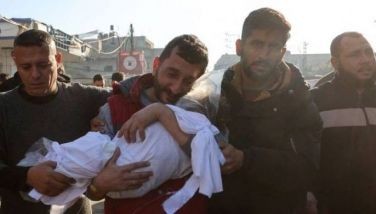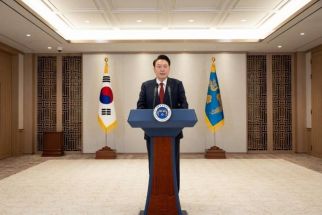Myanmar's minorities fear election victory by military
HPA-AN — During nearly seven decades the villages of the Karen have been torched, their men summarily executed and their women raped as the ethnic minority battled Myanmar's military regime in the world's longest-running insurgency. Their homeland has been called the "hidden Darfur," where some 350,000 people have been driven from their homes into the jungles or refugee camps in neighboring Thailand.
Now, many of the survivors are pinning their hopes on a historic election Nov. 8 pitting the military-backed ruling party against one helmed by pro-democracy icon Aung San Suu Kyi and numerous ethnic parties. They fear victory by the military's United Solidarity and Development Party would plunge Karen state and its 1.5 million people back into a hellhole.
"If the USDP comes into power, we will walk the same path. We will remain beggars. If they lose, the country will change. This is the final showdown," says Hkun Kyi Myint, an elder of several villages around Hpa-An, the state capital.
Ethnic minorities including the Karen make up about 40 percent of Myanmar's 52 million people. For them, the election is more than a step in Myanmar's uneven path toward democracy. It opens up the possible fulfillment of a long-cherished dream.
Shortly after the country, then known as Burma, gained independence from Britain in 1948, the Karen rose against the central government, which then and since has been dominated by the Burman ethnic majority. The country's first constitution and the 1947 Panglong Agreement, endowed with an almost mythic aura among ethnic people, promised a large measure of self-determination for minorities — even the possibility of secession.
All promises were broken following a 1962 military coup, after which a welter of insurgent groups from the Kachin, Shan, Karen and other minorities rose up in revolt. Myanmar historian and government adviser Thant Myint-U has called this endless, bloody struggle the country's "original sin."
"Myanmar will not be able to fulfill its potential, or provide the kind of future its people expect and deserve, without finding a lasting resolution to the ethnic conflicts it faces," says Tim Johnston, Asia director for the think tank International Crisis Group.
On Oct. 15, a National Ceasefire Agreement was signed after two years of talks and more than 200 meetings. President Thein Sein, who chairs the USDP, described it as "a historic gift from us to the generations of the future."
But only eight of the more than 20 armed groups signed it, including the Karen National Union (KNU), the minority's main insurgency group. Other ceasefires were negotiated in the 1980s and '90s, only to be violated.
"I hope for the best, but I have only about 10 percent faith in the ceasefire," says Mahn Khin Tun, a farmer and community leader near Hpa-An who has fought with the KNU.
Suspicions about the regime's sincerity were redoubled as its troops battled several insurgent groups while peace talks proceeded. Senior Gen. Min Aung Hlaing missed a meeting while in Israel shopping to upgrade weaponry for Myanmar's army of at least 250,000.
Fighting continues in several regions, forcing postponement or cancellation of polling in the embattled areas. In northern Kachin state, casualties have been reported on both sides recently, and more than 100,000 Kachin have been displaced since an earlier ceasefire collapsed in 2011.
"On the one side there is the election, and on the other the reality on the ground: continued attacks against ethnic groups by the Burma army with total impunity. And the international community will probably be silent because of the election," says Charm Thong, a Thailand-based human rights advocate from the Shan minority. There has been a build-up of troops in Shan state, she says, along with torture, confiscation of village lands for military installations, and the use of villagers as human shields.
Detailed documentation of military human rights violations by Myanmar forces has been accumulated by international organizations and the United Nations over recent decades, along with reports of abuses by some insurgent groups but not on anywhere near the same scale. The government has admitted to some extrajudicial violence while fighting what it describes as "terrorist organizations."
Despite uncertainty, peace has finally returned to some once-ravaged regions including areas of Karen state. Ethnic minorities have assumed a formal political role since 2011, when Thein Sein's nominally elected government began to institute tentative reforms.
Among the 93 registered parties for the upcoming polls, 59 represent ethnic or religious minorities. A third of parliamentary seats represent areas where ethnic minorities dominate.
"Today, most of Myanmar's ethnic minorities have a bigger say in how their country is run than at almost any time since independence," Johnston says.
However, their basic goals remain unfulfilled. These include sharing in the storehouse of natural resources of ethnic regions — including jade, timber, natural gas, gold and hydropower — that now flow into the pockets of the regime and its cronies. They also want a federal system of government to give their regions a degree of autonomy, and to stop the government from encouraging the assimilation, or "Burmanization" of ethnic minorities into the Burman mainstream.
Both the USDP and Suu Kyi's National League for Democracy have pledged to serve the rights of the ethnic groups if they win, with Suu Kyi saying she would convene a "second Panglong."
While Suu Kyi commands significant support among ethnic minorities, she has been criticized for not giving their concerns high priority, and for having members of her Burman-dominated party running against ethnic candidates throughout the country. Still, some ethnic political leaders hope their parties can form a ruling coalition with the NLD.
The military aside, ethnic minorities face other woes, constituting an alphabet soup of armed and unarmed groups, alliances and political parties that have never been able to make common cause. Some groups have degenerated into drug-running and smuggling mafias.
Nevertheless, many ethnic minorities see the election as a potential turning point for their aspirations.
"We have lived under so much oppression for 60 years, so when I cast my vote I hope this will help free us from fear. If I don't see this, I hope my children and grandchildren will," says Mahn Khin Tun in his village at the foot of the sacred Zwegabin mountain in Karen state.
Nearby, Hkun Kyi Myint, whose land was twice grabbed by authorities, plans for all seven members of his family to vote, though he doubts the ruling party will willingly give up power.
"They are dictators. If Suu Kyi wins they can always declare there is instability in the country and take control again. They have the guns, they have all the power," he says. "If USDP wins, people will revolt, and those who have weapons will take up arms again."
In Shwe Taw village, Peter Nyein, a Karen Baptist pastor, hopes for an end to the turmoil and violence. Government troops shot and wounded his son as he worked in the fields, and his daughter remains a refugee in Thailand.
"I can only hope that this time God will see to it and deliver us a good leader," he says. Then he laughs. "But if he sends down a USDP leader, the Lord and I will have to have a rethink."
- Latest
- Trending

































